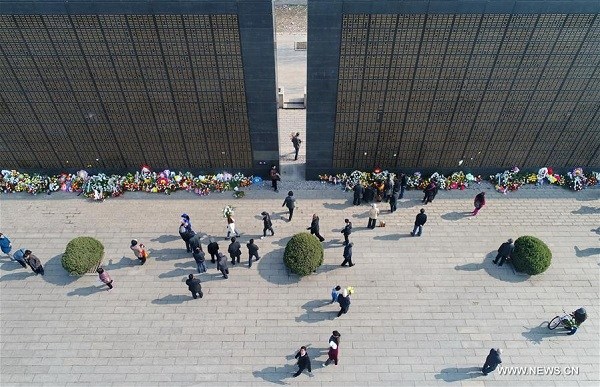
People mourn for the deceased in the 1976 Tangshan earthquake in front of a memorial wall in Tangshan, north China's Hebei Province, April 3, 2017. Tomb-Sweeping Day, or Qingming, falls early April, when Chinese people commemorate their deceased loved ones by visiting tombs. (Xinhua/Mu Yu)
For more than 2,500 years, the Qingming Festival, or Tomb-sweeping Day, has been an occasion for Chinese to mourn the deceased and worship their ancestors. Today, although there have been changes, the tradition is well preserved.
COMMEMORATION
Shi Yukun has spent 15 hours flying from Birmingham to Kaifeng in central China's Henan Province via Frankfurt and Beijing.
"To me, Qingming is an important holiday second only to Spring Festival," he said.
Shi remembered that when he was young, the entire family would plan a trip several days before the festival. They prepared sacrifices and went to the graveyard in groups.
"The little ones knelt down in front of the tomb while the adults performed rituals of worship," he said. "The children also had their tasks: folding the burning paper. The fastest would be rewarded during the picnic."
Shi went to the United Kingdom seven years ago.
"Only after I went out did I feel the emotional attachment of Chinese people to their ancestral home. Qingming Festival is a carrier of such a feeling," he said.
In western China's Qinghai Province, retired railway construction worker Zhang Shenglin brought alcohol to his former colleagues' tombs as always. Every Qingming, he will drink and talk with them.
"Seven of my fellow workers died in construction of the Qinghai-Tibet Railway, four in my arms," he said.
Zhang, 62, was a worker in 1974 when they started digging a tunnel on a 3,800-meter-high mountain.
"We spent three years to complete the tunnel, but some people died from floods during construction or were killed by falling stones," he said. "I miss them so much."
JOB OPPORTUNITIES
Shi and Zhang are among the hundreds of thousands of Chinese mourning the dead on Tomb-sweeping Day, which falls on Tuesday.
A cemetery in Changsha, capital of central China's Hunan Province, swarms with people, where Yang Xue and more than ten volunteers offer help to visitors, directing traffic and providing consultation.
"We will be working here for ten days," she said.


















































